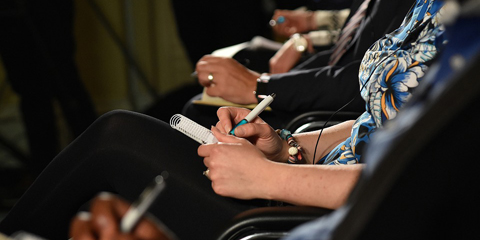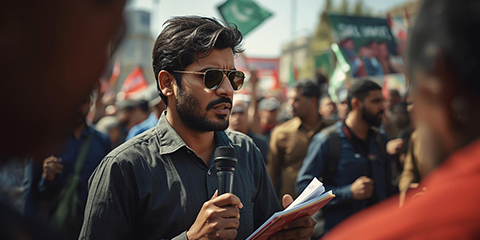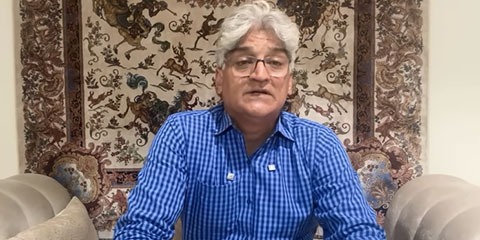What it takes to succeed as an anchor or reporter
JournalismPakistan.com | Published last year | Steve Manuel
Join our WhatsApp channel
Ever so frequently, we get queries from individuals and visitors to our website JournalismPakistan.com who wish to know how they can become an anchor or reporter and if it is necessary to undertake university courses to do so.
Importance of Education
Well, yes, of course. That is if they want to be good at the job and have an inkling as to what it’s about. To know the job, one needs to have a good handle on the basics, the essentials, the cogs, and the wheels, so to speak. For those are the tools that equip you for any job.
Misconceptions About Media Jobs
But for the most part, their inquisitiveness and ignorance are motivated by the misconception that media jobs are exciting, glamorous, well-paying, and easy to do. In some cases, this might be true, but mostly that would be the exception to the rule.
The Reality of Media Work
Most of the time, a media person’s job is like any other job… repetitive and requiring plenty of patience, know-how, hard work, and discipline. You do not get to be an anchor, reporter, or media personality just because the fancy takes over.
Essential Skills and Requirements
There are several requisites. First and foremost, it is essential to have acquired a reasonable level of education, fluency in the language, whether English or Urdu, and excellent knowledge in the preferred genre of the field of interest, i.e., current affairs, politics, human interest, sports, environment, women’s issues, etc.
Secondly, and very importantly, one must have the ability to string together a story/report in a cohesive, newsworthy, and attractive manner. Recognizing a story, a moment in time, or an incident and putting it into words or film intelligently and understandably is vital. Every story/report has a beginning, a middle, and an end. Yet so many people do not know which is which and tend to wander in their attempt to get their point across.
Recognizing the Impact of Stories
The need to recognize the scope and impact of a story/report is also vital for its success. To be a successful and respected media person, one must have relentless interest, push, and motivation while also being objective, and unbiased, and maintaining the ethics of the profession. One must also be prepared to expect the unexpected.
Challenges in the Media Industry
Many half-baked and so-called journalists, and these days Pakistan’s media industry is weighed down by them, have come into the profession through the back door. They have been planted by ‘friends’ and relatives or through the sheer abuse of power and influence. They have no formal training and no interest in getting it either. They are seduced by the screen or by-line. They come in expecting to be overnight stars, bringing with them ridiculous, bizarre ideas of what the job should be like according to them, and expect everybody to fall in line because their ‘uncle’ is so-and-so.
Importance of Media Ethics
These are the people who have no idea about ethics and the impact of quality reporting/writing. They foist their fancies and biases on the public, who have been so abused by the likes of them that they are unable to discern truth from bias and propaganda.
The Allure of Glamour
It is glamour they seek, and they will obtain it one way or the other, no matter what the cost. Many newcomers to the profession fail to check the facts and authenticity of their stories as well as sources, resulting in the publication of fabrications. It’s a dis-service and miseducation. They think it is alright to pepper their reports and packages with embellishments and untruths, willing to take risks and hope that nobody will know the difference.
The Consequences of Misreporting
But guess what… such habits have a nasty habit of turning on you and biting you where it is uncomfortable. The truth will always be out. Also, most newcomers to the job are unaware that a report is not a commentary. They have not been taught to differentiate between the two. Irresponsible television reporting and writing habits have contributed hugely to this factor. A good report is sticking to the facts and reporting them as they are without any personal coloring. This means keeping your opinions and beliefs to yourself.
The Importance of Objectivity
For a good report, it is a must to keep cynicism and unsubstantiated material out and tell the story as it is. Some years ago, while interviewing a candidate for a television channel, I asked why he wanted to become a news anchor/newscaster. His answer: “I want to be famous.” Nothing wrong with that, but achieving that status requires a lot of hard work and an understanding of the profession. What he didn’t realize was that it is one’s work that speaks loudest and makes one famous. You don’t get famous just because you want to. If wishes were horses.
The Path to Success
What stunned me was that this individual explicitly confessed he had no interest in news, current affairs, politics, etc. He also had a terrible accent and frequently slurred and mispronounced words. I’m not sure if the above three were because of the paan he insisted on chewing throughout the interview.
Two weeks ago, I got an email from a visitor to our website. This one wanted to know how he could join the Khaleej Times in Dubai. I tried to get him to understand that he needed to have at least a Master’s degree (he did not), have worked for a few years in an English-language newspaper (he had not), have a reasonable number of published stories (he had none), and at least have some testimonials (he had none). Yet he expected me to make a call to the editor of the Khaleej Times and recommend him for a job!
The Competitive Nature of Media
He could not comprehend that, just like any other job, media jobs, whether domestic or foreign, have requirements that need to be met. It did not occur to him that, like all other jobs, there is a long queue of qualified, experienced journalists always on the lookout for a better opportunity. I told him to get ahead of them, he needed to prove himself.
His reply was, “Oh!!”
The media is a vibrant, competitive industry, and unless you have some real influence or clout behind you, it’s not easy to pierce. Nobody gets in free, just like that. At least not on a whim.
Photo credit: Ai Generated Stock photos by Vecteezy

























